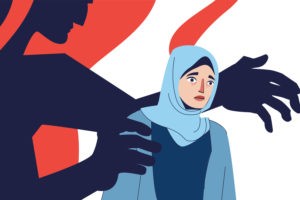What Should I Do? – Witnessing an Assault
 I. Details about the situation
I. Details about the situation
Amir normally walks to work everyday. One morning he sees a young woman being accosted by a male stranger. He immediately notices that the man is being verbally abusive to the woman and using pejorative terms, even pushing and shoving her. It is apparent to Amir from what he sees and hears that it is motivated by prejudice and racism. Although there are other people around walking by, no one is stepping in to stop the aggression and protect the young woman. Instead, people have stopped and pulled out their phones to record the incident. Amir feels a strong desire to intervene but he is not sure if it is his responsibility. What should he do?
II. Background
It is reported that Imam Ali (p) said, “All righteous actions, including struggle in the way of God, when compared to the act of enjoining good and forbidding evil or amr bil-maruf wa nahi an al-munkar, are like the water in one’s mouth when compared to the water in the deep oceans.” Islam advocates exhortation of others to do good and forbid or resist evil so that lofty values are upheld and the sanctity of every human being is preserved. Moreover, adherence to this code of practice protects society from degradation by actively decrying injustice and not tolerating it, however small, and promoting universal safety and security. This responsibility falls on all of us; it is reported that the Holy Prophet (pbuh&hp) said, “Whoever enjoins others to do good and forbids them from evil is considered to be the vicegerent of God in His earth and the vicegerent of the Messenger of God and the vicegerent of His Book.” Keeping in mind that Islam respects the privacy of each individual, it also exhorts us to act when something untowards, improper or evil is happening in the open in front of our eyes. This requires that we know the conditions and criteria for acting given the existing circumstances as well as understanding the limits of what we should or should not do.
Ruling
Enjoining good and forbidding evil or amr bil-maruf wa nahi an al-munkar is wajib kifai, which means it is a collective obligation. Once a person or group of people fulfill it, then the obligation falls from everyone else. When intending to fulfill the obligation, the following requirements should be considered:
The person must possess knowledge of what is good and what is evil.
The person must believe it likely that the wrongdoer will listen and be affected by it.
Note: according to Sayyid Sistani, one is required to do so even if it does not have any effect on the person, based on obligatory precaution.
The wrongdoer intends to continue the evil act.
The person must not be at risk of significant harm being inflicted to themselves or their reputation or wealth as a result. In addition, it must not cause excessive difficulty or unendurable hardship, except in the case when the matter is regarded as being so important to God that one must endure harm and hardship in its cause.
As such, enjoining good and forbidding evil is carried out in different ways:
1. Displaying sincere displeasure and aversion. For example, by turning away one’s face from the wrongdoer or not speaking to them.
2. Verbally advising and guiding the wrongdoer.
3. Physically intervening to prevent the wrongdoer.
IV. Action
If no one has intervened, Amir should immediately determine the best course of action by first assessing if there is any risk of harm or danger to himself (as detailed above). If he is confident that he is secure and safe, then Amir should fulfill the obligation of amr bil-maruf wa nahi an al-munkar by denouncing the man’s actions against the young woman, either by calling the police or taking some other legal means to stop what is happening.
If Amir is not able to actively intervene for any given reason, then he must at least shun and denounce the evil act that he witnessed in his heart, and at least report the incident to those who are in a position to address and remediate it where he lives. As such, turning a blind eye is not an option and it is certainly not appropriate to merely video tape what is happening unless it is used to report the crime.

Leave a Comment:
You must be logged in to post a comment.